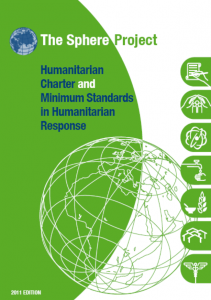 |
Sphere Minimum Standards and Indicators for Humanitarian Response (SPHERE, 2011)The Sphere Handbook is one of the most widely known and internationally recognized sets of common principles and universal minimum standards for the delivery of quality humanitarian response.
|
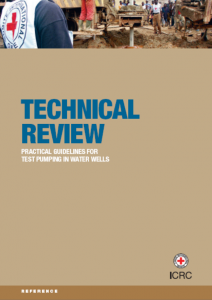 |
Practical Guidelines for Test Pumping in Water Wells (ICRC, 2011)Pumping tests are a practical way of obtaining an idea of the borehole’s efficiency and its optimal production yield. Much of the specialized knowledge and technical expertise needed for this purpose can be gained from the standard literature. However, field operations in remote areas or in difficult conditions often require flexibility and imagination in avoiding or solving technical problems. These guidelines are intended mainly as a practical tool and
|
 |
Borehole Drilling and Rehabilitation Under Field Conditions (ICRC, 2011)Constructing, or repairing, boreholes requires specialized knowledge and technical expertise, much of which can be gained from the standard literature; but field operations in remote areas or in difficult conditions often require flexibility and imagination in avoiding and solving technical problems. This review is intended as a decision-making tool to assist in making cost-effective choices between borehole drilling methods, and in deciding whether to drill new boreholes or rehabilitate existing sites.
|
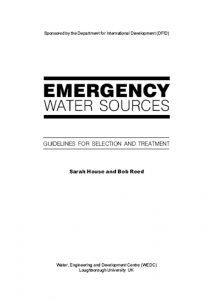 |
Emergency Water Sources (WEDC, 1997)These guidelines have been designed to help those involved in the assessment of emergency water sources to collect relevant information in a systematic way, to use this information to select a source or sources and to determine the appropriate level of treatment required to make the water suitable for drinking.
|
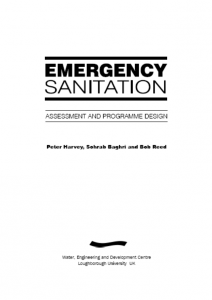 |
Emergency Sanitation (WEDC, 2002)The book Emergency Sanitation: Assessment and programme design has been produced to assist those involved in planning and implementing emergency sanitation programmes. The main focus of the book is a systematic and structured approach to assessment and programme design. It provides a balance between the hardware (technical) and software (socio-cultural, institutional) aspects of sanitation programmes, and links short-term emergency response to long-term sustainability. The book is relevant to a wide range of emergency situations, including both natural and conflict-induced disasters, and open and closed settings. It is suitable for field technicians, engineers and hygiene promoters, as well as staff at agency headquarters.
|
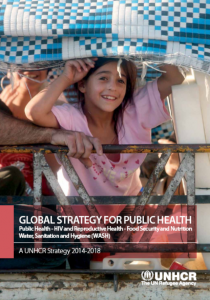 |
UNHCR Global Strategy for Public Health 2014 – 2018 (UNHCR, 2014)This document describes UNHCR’s global strategy for public health through a set of guiding principles and strategic approaches including protection; age, gender and diversity; equity; access; sustainability; community empowerment; appropriateness and reliability; partnerships and coordination; capacity building; communication and advocacy; integrated approaches; measurement and monitoring; and innovation. The document describes strategic objectives and enabling actions per sub-sector (Public Health, HIV and Reproductive Health, Food Security and Nutrition, and WASH).
|
 |
Excreta Disposal in Emergencies – A Field Manual (WEDC, 2007)The purpose of the manual is to provide practical guidance on how to select, design, construct and maintain appropriate excreta disposal systems in emergency situations. Relevant situations include natural disasters, relief for refugees and Internally Displaced Persons (IDPs), and complex emergencies, focusing on rural and peri-urban areas. The manual presents a process, which can be followed to assess the current excreta disposal needs and priorities, and to design an appropriate programme to respond to those needs. It can also be used to select appropriate excreta disposal technologies, systems, and hygiene promotion interventions. The manual provides guidance on how to plan, design and construct systems, and how to maintain and promote appropriate use of those systems.
|
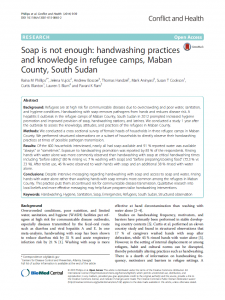 |
Soap is not enough: handwashing practices and knowledge in refugee camps, Maban County, South Sudan (Buffalo University, 2012)Refugees are at high risk for communicable diseases due to overcrowding and poor water, sanitation, and hygiene conditions. Handwashing with soap removes pathogens from hands and reduces disease risk. A hepatitis E outbreak in the refugee camps of Maban County, South Sudan in 2012 prompted increased hygiene promotion and improved provision of soap, handwashing stations, and latrines. We conducted a study 1 year after the outbreak to assess the knowledge, attitudes, and practices of the refugees in Maban County.
|
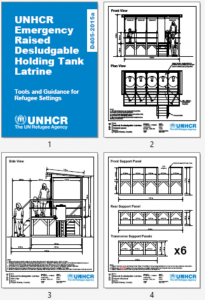 |
D405-2015a Emergency Desludgable (Raised with Holding Tanks) Latrine Design and BoQ (UNHCR, 2015)This document contains documentation to help UNHCR and WASH actors build emergency raised desludgable latrines in refugee settings. The package includes: Technical Drawings; Step by Step Construction Drawings; Bills of Quantity; Material and Workmanship Specifications; and Design Calculations.
|
 English
English